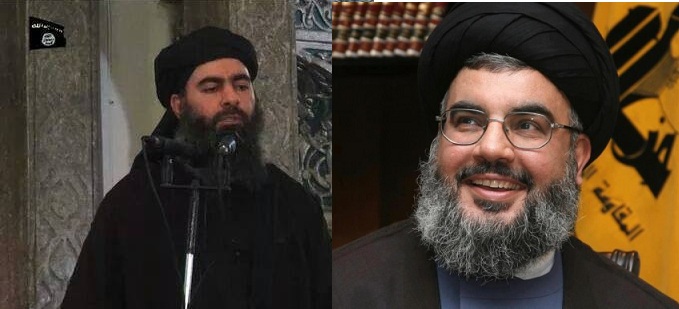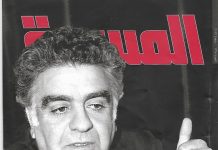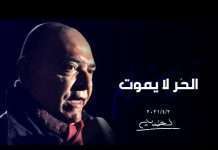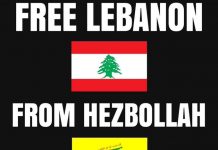ANALYSIS/Hezbollah is stronger than ever and closer to Europe than we think
ازمينا صديّق من موقع العربية: حزب الله أقوى من أي وقت وأقرب إلى أوروبا أكثر مما نعتقد
Azmina Siddique/Al Arabiya/August 23/18
Hezbollah is stronger than at any time since its inception, according to a recent statement by the group’s leader, Hassan Nasrallah. The message was part of a television broadcast on the anniversary of a 2006 war with Israel, and in the ensuing 12 years Hezbollah is estimated to have significantly expanded its stockpile of weapons, including rockets and missiles.
Much of this increase in capability has taken place because of Hezbollah’s role in the Syrian conflict, where the Iran-backed group has its largest deployment outside of Lebanon (between 7,000 to 10,000 fighters) and is fighting alongside pro-Assad forces. According to the Centre for Strategic and International Studies (CSIS), Hezbollah has increased its weapons reserves, better trained its members and improved its tactical and operational skills during the conflict. Indeed, during the recent broadcast, Nasrallah announced the group would “very soon” celebrate victory in Syria.
Yet Hezbollah’s increase in operational capability will no doubt be offset by recently renewed US sanctions on Iran, which is estimated to fund its proxy Hezbollah by up to $200 million a year. These financial pressures are likely to make Hezbollah leverage its significant global network and put more effort into its international funding activities, which range from extortion to smuggling, spanning from South America to and via Europe.
Beyond the battlefield
Hezbollah has influence and operational capability beyond the battlefield, to which Europe is certainly not immune. For example, an undercover US Drug Enforcement Agency (DEA) investigation identified a UK-based Hezbollah associate who was carrying out money laundering as part of the group’s international drug trafficking network, alongside recent related arrests in France and Germany. A global network of shell corporations and criminal enterprises worth more than $1 billion a year also finances Hezbollah’s global terrorist activities, including a 2012 attack on a bus in Burgas, Bulgaria.
However, although Hezbollah presents a real threat to EU security and the issue has been debated in both the European and UK parliaments as recently as in January 2018, no EU member state apart from the Netherlands currently proscribes Hezbollah in its entirety. Instead, like the UK, the EU bans the group’s military wing and not its political one, even though in reality the group’s military and political leadership is unified. Even Nasrallah has implied there is little distinction between the two “wings” and Hezbollah’s deputy leader Naim Qassem has stated “we don’t have a military wing and a political one”.
The decision to only partially proscribe Hezbollah reflects the complex nature of the organisation, which has a strong social welfare presence in Lebanon and holds half of the country’s parliamentary seats, following the elections in May. Indeed, when the initial decision to ban the militant wing of Hezbollah was made, UK authorities worried that full proscription of the organisation would hinder political and diplomatic engagement with Lebanon. Even earlier this year, Labour leader Jeremy Corbyn’s Home Affairs team urged MPs to vote against a non-binding motion to ban the group in its entirety. Yet countries like the United States, Canada and the Netherlands have banned Hezbollah in full, but still continue to maintain full diplomatic relations with Lebanon.
Furthermore, full proscription of the group has received support from UK lawmakers from across the political spectrum, including Labour MP Joan Ryan and Conservative MP Tom Tugendhat. London Mayor Sadiq Khan has also called on the Home Secretary (Interior Minister) to ban the group in its entirety, as the loop-hole in distinguishing between the group’s two so-called ‘wings’ means that under UK law, the group’s supporters are free to fly Hezbollah’s machine-gun emblazoned flag on the streets of London every year during the ‘anti-Zionist’ Al Quds day march. These leading political voices have rightly recognised that seeing Hezbollah’s militant and political activities as distinct is a mistake.
The UK Home Secretary has the power to fully proscribe Hezbollah under the Terrorism Act of 2000 and should not allow Hezbollah’s multi-faceted nature to detract from the real and present threat it poses. Furthermore, the UK should encourage our EU neighbours to join us in a co-ordinated move, to signal Europe’s zero-tolerance towards militancy, crime and violence.
*Azmina Siddique is a Policy and Advocacy Advisor at the Tony Blair Institute for Global Change. She tweets @AzminaSiddique




















